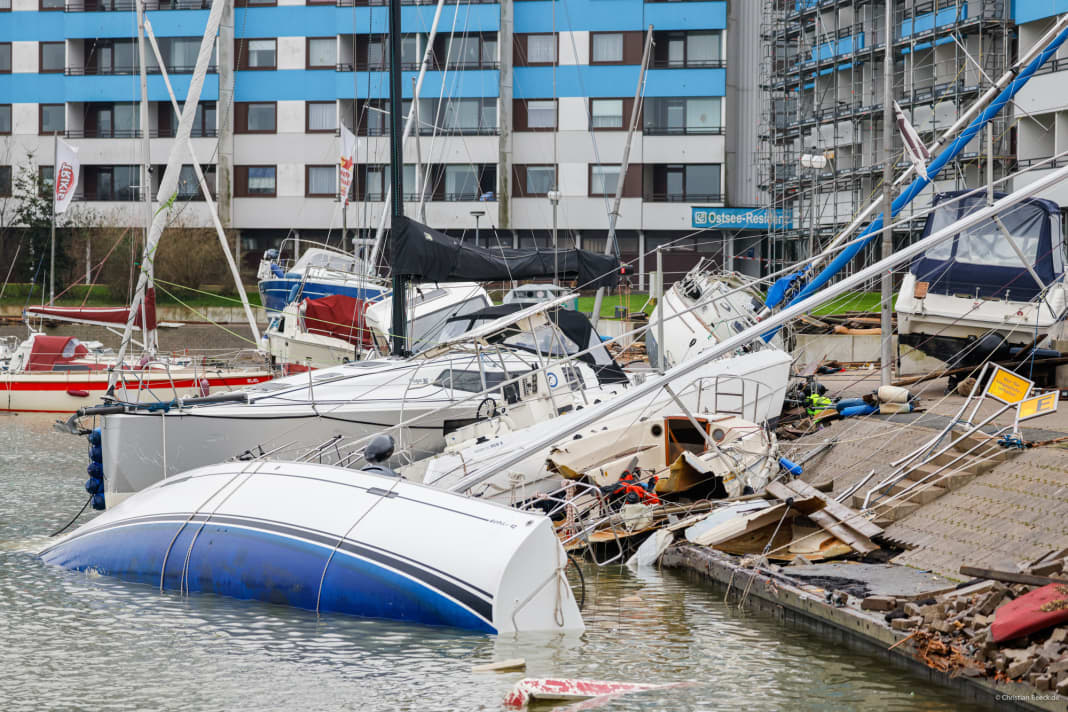





The harbour office of the city of Kiel has issued a harbour authority order for all recreational boat harbours in Schleswig-Holstein, which should initially be considered unrealistic. The wording is as follows:
"All damaged or sunken watercraft (including their sunken components/accessories) must be salvaged by a specialist company without delay, but by 31 October 2023 at the latest. After salvage, the vessels must be secured in such a way that they pose no further danger (including environmental hazards) (disposal, repair, storage, etc.)."
According to state regulations, the port authority is authorised to issue this type of order for security reasons.
But why this tight deadline? Although salvage companies such as the Marine Claims Service (MCS) are in the process of recovering the boats, the large number of cases and the difficult conditions in some cases mean that it is highly unlikely that they can be fully salvaged within the set deadline. This is confirmed by Jonas Ball, Head of Marketing at insurance broker Pantaenius, among others.
Harbour master and head of the authority Michael Schmidt comments on the deadline: "We issued the order on Monday. On the one hand, we wanted to build up a certain amount of pressure, as some of the sunken yachts pose a risk to the environment or shipping traffic. However, there was still no comprehensive overview of the extent of the damage on Monday. If it is not possible to salvage all the boats within the deadline, we will extend the deadline."
Saving straw for those affected after the storm surge
Another aspect of the order concerns insurance. It could be a saving straw for all those who only have liability insurance for their boat, but no hull insurance. According to Jonas Ball, this would only affect a few owners at present, but could be very expensive for them.
Hull insurance for the boat usually includes salvage costs in addition to the damage to the boat. If there is no hull insurance, but only boat liability insurance, this is not normally covered. Affected owners would therefore have to pay the sometimes high salvage costs out of their own pocket.
- Read more in this article: Will the insurance companies pay for the damage?
However, due to the official order, a different circumstance could now arise with regard to the salvage. "With the order, the salvage becomes a public law case," says lawyer Benyamin H.K. Tanis from the Kiel law firm Tanis von der Mosel, which specialises in yachting. "The salvage is therefore enforced. It can therefore be a case for boat liability."
Those affected should check whether their policy contains the following clause or something similar:
Public-law obligations or claims for the remediation of environmental damage in accordance with the Environmental Damage Act (USchadG) are also insured if the emissions causing the damage were released into the environment suddenly, accidentally and contrary to regulations during the validity of the insurance contract or if the other damage was caused suddenly, accidentally and contrary to regulations.
This clause should be invoked vis-à-vis the insurer and the harbour authority order should be sent at the same time.
Even for someone who has a very old personal liability policy, i.e. no boat liability, it may be worth taking a look at the insurance conditions. According to Tanis, newer policies normally exclude damage caused by the operation of aircraft or water sports vehicles. This is often the case with jet ski accidents, for example. However, if there is no such clause in older policies, there is a chance that a personal liability insurer will also cover the claim.

